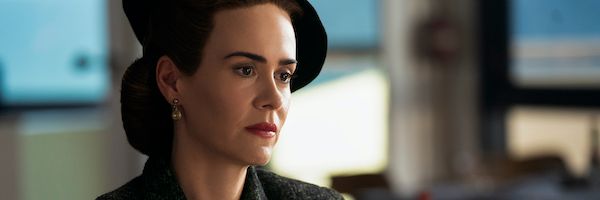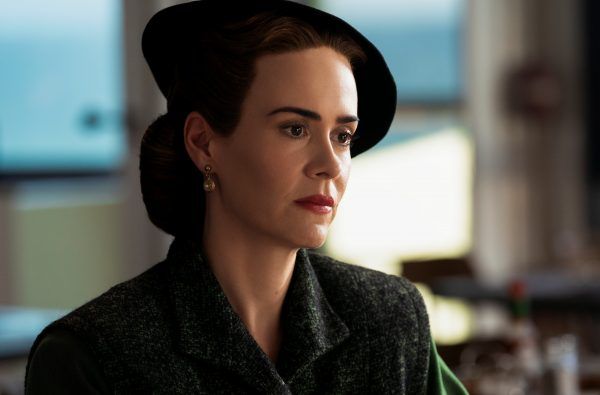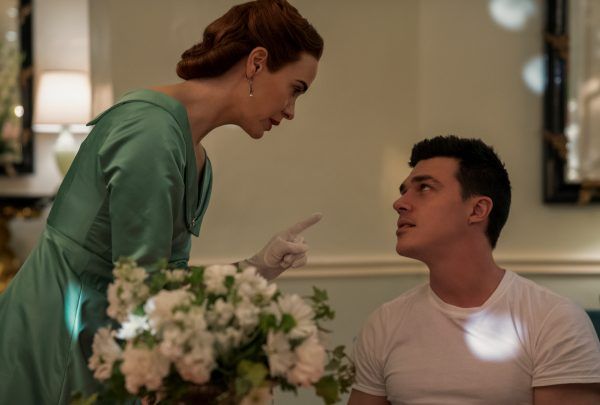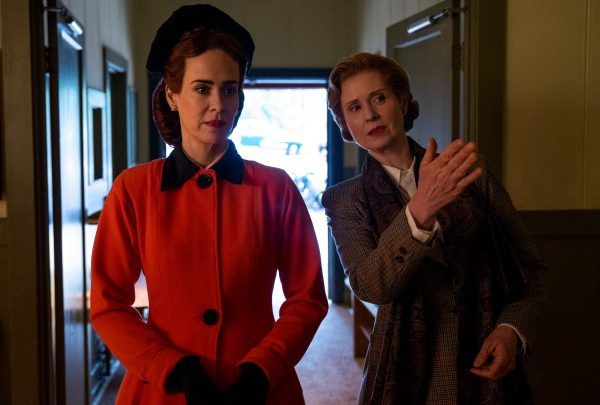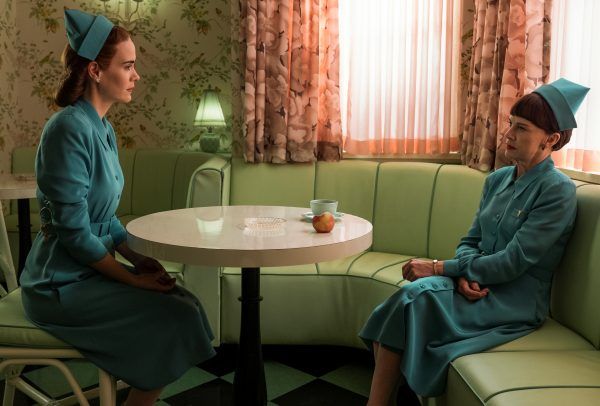From creator Evan Romansky and executive producer Ryan Murphy and Ian Brennan, the Netflix series Ratched crafts a haunting origin story for the iconic character of Nurse Ratched in One Flew Over the Cuckoo’s Nest. The story begins in 1947 as Mildred Ratched (Sarah Paulson) arrives in Monterey County in Northern California seeking employment at a psychiatric hospital conducting experimental procedures on the human mind. While she presents herself as the perfect nurse for the job, Mildred has a deeper and darker mission she’s pursuing which comes with potentially dangerous consequences.
During this 1-on-1 phone interview with Collider, Paulson talks about how she first found out about this project, the imposing nature of taking on this character, whether it was scarier to take on Nurse Ratched or Marcia Clark in American Crime Story, how she approached finding Mildred at this stage of her life, all of the fascinating character dynamics, finding a welcome relief in the relationship between Mildred and Gwendolyn (Cynthia Nixon), and the laughs she had on the set. She also talked about her excitement to work with Macaulay Culkin in Season 10 of American Horror Story, and why she’s looking forward to trying her hand at directing again for the spin-off American Horror Stories.
COLLIDER: What was your reaction to finding out about Ratched? I would imagine that you’re used to hearing a lot of idea from Ryan Murphy. Was this one surprising?
SARAH PAULSON: It was, and it actually didn’t come directly from him. This was actually one of those moments where my agent called and said, “He’s got this script. Has he mentioned it to you?” And I was like, “No, he hasn’t.” So then, I called him and I said, “What’s this Ratched business, and why are you pretending that I’m not playing that?” And he was like, “Well, I don’t know. I didn’t know if you would want to. It’s obviously an imposing thing to consider taking on, given Louise Fletcher’s arguably perfect, Academy Award-winning performance. It just seems like maybe you might not want to take a bite out of that.” And I was like, “Well, you might be right. Nevermind. Goodbye.” And then, he said, “No, let me just send it to you.” And he sent it to me.
On the first page, I said, “If I don’t get to play this, I’m gonna throw a tantrum in the street.” So, I called him up and he said, “Okay, but before we really begin this, I just want you to understand what this is gonna mean. You’re gonna be working every day. You won’t have a day off. You’re gonna be playing the same character, season after season. On American Horror Story, one of the things you’ve always told me you love is how every year you get to do something new and you never get bored. I just wanna make sure that we don’t start down this road, only to have you be like, “Wait. Nevermind.” And I said, “No, I’m ready for it. I wanna do it.” That’s how it happened.
Which role would you say was scarier to take on, Nurse Ratched or Marcia Clark (for American Crime Story)?
PAULSON: They were equally terrifying to take on but for different. Marcia Clark is a real person. I know Nurse Ratched feels like a real person because of Louise Fletcher’s iconic performance but she’s not real. The wonderful thing that we allow, when people go to the theater and we see many different iterations of famous plays and different actors taking on different roles, is that it’s open for interpretation and you always come up against the potential for people having big opinions about how this version of Amanda Wingfield (in The Glass Menagerie) wasn’t as good as this other version of Amanda Wingfield. That’s part of the joy of getting to do some of these big works. But with Mildred, I thought that the fear here would actually be battling other people’s expectations and commitments to their feelings about the movie and not wanting to see anybody come in and change their view of the movie or of her performance. People love to hate her. I hope if we’ve done it right that people might wonder if she was so evil, after all.
Because this is a character that had already existed, how do you then approach forming your version of her and figuring out how you want to embody her? Do you take into account that other portrayal, or do you try to not think about that?
PAULSON: Well, I think it would have been disrespectful for me not to have watched the movie multiple times before I started. The only reason I get to do it is because she was so brilliant and there was so much mystery around her character and so much not known, and the steeliness of it and the commitment. So many actresses of that day did not wanna play the part. They all turned it down. Nobody wanted to be associated with playing somebody so awful. I think it’s very brave that Louise Fletcher did that and, of course, did it more brilliantly than anyone could have and won an Oscar for that bravery and that choice.
For me, I wanted to watch it. I wanted to think about Louise Fletcher’s performance, almost as the spine of what I would do and how I would stand. I thought about her often. I had her dancing around my thoughts, as much as I could. But then, I had to have elasticity around this. This is 20 years prior. It precedes Cuckoo’s Nest by 20 years. Are you who you were, 20 years ago? So, the idea that she would have some characteristics that are familiar to us, as viewers, versus me trying to do a carbon copy of her voice or of her, at all, it just seems like our Mildred is not where her Mildred is yet. She’s just not there yet. She’s still in process. She’s still becoming. So, I had a little bit of latitude.
Do you feel like Mildred is someone who, from the beginning, has a fully thought-out plan that she’s carrying out or does she really have to think and act on the fly more than we realize, as all of these other things get thrown in her path?
PAULSON: I think she has one plan, and that is to absolve herself of the guilt of having abandoned Edmund (Finn Wittrock) at a critical moment in his life. The plan is to save his life and to keep him from being executed. Her job is to get herself a job at that hospital. Her job is to be employed where Edmund is going to be housed. That is her only goal. Once she does that, everything else is happening as it’s being revealed, in terms of what the dynamics inside the hospital are like, where he’s being held, and whether or not she’s gonna have access to that, all that stuff she has to figure out when she’s in. She just needed to get in. The rest of it develops as it develops. She figures things out on the fly, and she’s very good at it.
There are so many fascinating character dynamics in this, from Edmund to Dr. Hanover to Gwendolyn to Charles Wainwright. With this embarrassment of riches of incredible character dynamics, did you have one that you found most fun to explore?
PAULSON: I know. Talk about another gift Ryan Murphy has given me. She’s just an extraordinarily dynamic character with so many sides, and the thing that’s so interesting about it is that none of them are integrated. All of the facets of Mildred are stand-alone compartments that she has not figured out how to stitch together to form an integrated human being. Each one of them were like their own little installments. With each interaction with all of the characters you mentioned, she’s almost a different person with all of them because every single dynamic that she has, except for with Gwendolyn, she’s somewhat on the make. She needs something. And ultimately with Gwendolyn what she needs is the most important thing that we all need in life, which is to have some kind of connection with another human being. My time doing that stuff with Cynthia [Nixon] was very, very exciting because that was the only time Mildred experiences joy on the show. It was a very welcome relief for me to be able to do that stuff, and to do it with someone that’s as wonderful and as talented as Cynthia and as available emotionally. It’s very easy to fall in love with her. Mildred has an almost childlike way of being around Gwendolyn. It’s a side of her you don’t see her engage in with any other person. It’s very young and it’s open and it’s terrified and a bit tremulous. And then, ultimately, by the end of the series, in this first eight-episode installment, she has a closeness with her that is unprecedented for Mildred.
And it’s such an interesting contrast to the relationship that your character has with Corey Stoll’s character and the way that she narrates that dynamic.
PAULSON: I think she’s trying to simulate what she thinks that should be. It’s a communication and a dynamic of her trying to enact some version of grown-up intimacy that she doesn’t actually know anything about. She knows nothing about, so she’s doing what she thinks a man and a woman do, and how she imagines they behave. It’s some antiquated weirdness that is just next-level if you ask me. We had a hard time shooting those [scenes] because we couldn’t stop laughing. We just could not stop laughing.
You’ve done a lot with Ryan Murphy and he’s thrown a lot of things your way, and I’ve often wondered if you still have the occasional moment where you crack up in a scene because it’s just so insane.
PAULSON: Yeah, that does happen, and it happened with Corey a lot. I was laughing all the time with Sophie [Okonedo], all the time with Judy [Davis], and all the time with Corey. Those were my little giggle buddies and we couldn’t keep straight faces. And probably with Judy the most, I ruined take after take. She just really makes me laugh. Her Nurse Bucket is so brilliant.
You’re also set to return for Season 10 of American Horror Story. What most excites you and intrigues you about adding Macaulay Culkin to the mix?
PAULSON: Oh, I think it’s so brilliant of Ryan to do something like that. It’s that thing where he basically says, “Oh, you think you know this actor and you know what they’re capable of? I’m gonna show you something else.” A great big swath of the people that love Macaulay Culkin love him from a particular era when he was a child. To watch him do some of the very grown-up things he’s gonna be doing – because I’ve read the first two episodes – and turning all of your expectations on its head will be thrilling for the audience and good fun. I do get to work with him, so I feel really excited about that. I can tell you that. No one knows that. You know that now.
You’ve directed an episode of American Horror Story and you’ve said that you’ll be directing for the spin-off, American Horror Stories. What did you learn from your experience as a director on the show and what most excites you about getting to do it again?
PAULSON: What excites me most about getting to do it again is hopefully doing it without pulling every hair out of my head. I was supposed to direct Episode 8, and when we were shooting Episode 5, Ryan called me on the phone and said, “I think you should do Episode 6.” And I was like, “What? I wouldn’t be able to prep.” He was like, “It’s fine. I think you should do it because Jessica [Lange] is gonna come back and it’s the "Return to Murder House" episode. It’ll be really fun for you. You’ll get to work with all these actors and you guys all love each other.” I was like, “I don’t have any time to prep.” He was like, “It’s fine. People will help. It’ll be fine.” Meanwhile, Cordelia, who I was playing at the time, was very heavy in the episode that we were shooting. So, on all of our turnarounds when we were waiting to set up another scene, I would walk over with my first [assistant director] and we would sit down and he’d be like, “So what kind of crane do you want for tomorrow?” And I was like, “A crane? How about a big crane.” It was something. It really was.
I’m very much looking forward to doing it again, with some prep and with the confidence that it’s something I can actually do because I did do it and I did it under nutty circumstances, in terms of having no time. It was incredibly exhausting and I was nervous the entire time but also charged and thrilled and in love with it. I thought, “I’ve gotta have an opportunity to do this again, where I’m not weeping.” It will be a good opportunity. I wanna still do it in an environment where I feel safe, where the crew are all people that I know, and where I’ve got Ryan. Ryan let that episode be 79 minutes. He was just so kind to me. He didn’t cut any of my stuff and I was just so grateful. I kept making the case, “The fans would want the ‘Return to Murder House’ episode to be as long as it needs to be. They wanna see these people again.” And he was like, “All right, fine.” He was so generous with me. So, what I loved about it was that it was confronting, and what I hated about it was that it was confronting, and I’m looking forward to doing it again, so it can be just a tiny bit less confronting.
Ratched is available to stream at Netflix. For more, read our review of Ratched here.
Christina Radish is a Senior Reporter of Film, TV, and Theme Parks for Collider. You can follow her on Twitter @ChristinaRadish.

